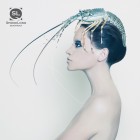I had decided this wonderfully strange and chilling story was about a dead-bedroom marriage, but the disturbing relationship between the narrator and her husband reflects something much darker and complex. Women “across America” in this story are not just buried alive; they are violently loved, “drowned in love,” and “tucked”/fucked into darkness. What interpretations emerge for you?
First of all, thanks! Second of all, I’m not exactly sure. I woke up one day with the image of a husband and a shovel and The Bachelor. Or maybe I put The Bachelor there afterwards. I tend to do that. I love that show.
Anyway, on one hand it’s about this wife. She’s sick of being buried. At the same time, she has a cushy life. She has Sex and the City and this kind of awesome coffin. It’s not the cheap one. So it makes it harder for her to leave.
The America bit popped in at the end. I didn’t know it was there. And then the lines came, and I knew there was more to it. A deeper and more disturbing violence. This happens to me a lot. I’ll be writing and then I’ll realize there’s more, but I don’t know it until I’m deep into the story.
You refer to Hollywood icons, television shows, and pop culture to illustrate this narrator’s experience, and I think of the testimonies of people, primarily women, in the film and publishing industries—indeed, everywhere—who have struggled with sexual harassment and assault. I read your story both as illuminating and as subversive. Can you tell me about the origin of this story in this context?
It’s funny, but the other day I was thinking of how weird the timing of this piece is. I wrote it for a class with Meg Pokrass back in August, and the Times article about Weinstein came out in fall, so I can’t take credit for making it about a bigger theme. And to be honest I’m bad at that. Theme-making. The story always dies. I have to write it from the gut.
What’s going on with the husband character who is “good at makeup”?
That is an excellent question. I am not really sure. He just popped up. And he could do lipstick in an amazing way.
You are a reader for Bellevue Literary Review as well as a former editor for Bartleby Snopes Literary Magazine. You have written about flash fiction and have recommended some favorite authors and examples of the form. How has your exposure to flash as a reader and editor contributed to your formation as a writer? How is your work in flash growing and changing?
I love this question. A lot of my pieces took themselves a wee bit seriously. Reading taught me that you didn’t have to do that. You could have fun. Be funny. You could make potty jokes—OK, maybe not potty jokes, but you could still have fun. Husbands could bury their wives and be home in time to catch Game of Thrones. Or The Bachelor. Or preferably both, as a doubleheader. Though to be honest I never did get into Game of Thrones. I am a Bachelor/Bachelorette girl all the way.
Also, when something’s dark I think you need humor more than ever. I love pieces that do that—mash up sad and funny. Like “These Are the Rules of Our Canopy Shyness and Life” by Santino Prinzi or “Everything’s Shitty at Price King” by Kathy Fish.


